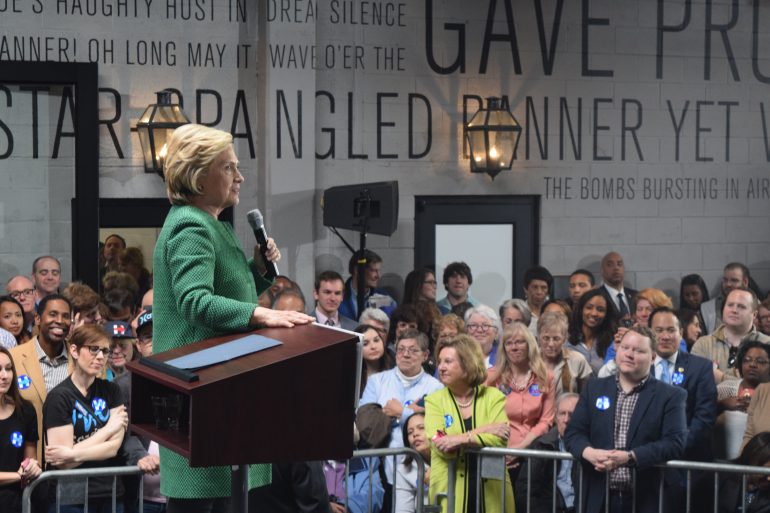By RACHEL BLUTH, DAN RUSSO, ALEXANDRA PAMIAS and REBECCA RAINEY
Capital News Service
COLLEGE PARK — Former Secretary of State Hillary Clinton and businessman Donald Trump won their party primaries in Maryland Tuesday, further cementing their status as presidential frontrunners and making it more than likely they will be opposing each other in the fall.
Clinton defeated her rival, Vermont Sen. Bernie Sanders, in Maryland’s Democratic primary. On the GOP side, Trump easily turned back Texas Sen. Ted Cruz and Ohio Gov. John Kasich.
With 97 percent of the state’s precincts reporting, Clinton led Sanders 63 percent to 33 percent. Trump had 55 percent to Kasich’s 23 percent and Cruz’s 19 percent.
There was little doubt about the outcome: television networks called Maryland for Clinton and Trump less than a minute after the official 8 p.m. closing time, even though a handful of Baltimore precincts still were open by court order.
At an Irish pub in a strip mall in Ellicott City, most of Clinton’s supporters hadn’t even arrived at her campaign’s watch party when networks declared her the winner.
Sen. Ben Cardin, a Democrat, said he wasn’t surprised at Clinton’s victory, as he addressed supporters in front of a Maryland state flag and behind a “Hillary” sign at the watch party.
“I think Maryland voters live very close to D.C., they understand politics, they understand this primary process and they know that Hillary Clinton is the person they want as president,” Cardin said.
Clinton, who had the support of every member of Maryland’s congressional delegation, was the favorite in the state: the Real Clear Politics average of polls had her winning by 24 percentage points going into the primary.
Isabel Langsdorf, 78, of Kensington, voted for Clinton. The retired tour guide said “there’s an eligibility factor going on here.”
“I think that she’s a heck of a lot better than the ones who are running on the Republican side,” she said of Clinton. “She’s a sensible person. We all make some little mistakes but I’ve always liked her.”
But Marie Henderson, 84, of Columbia Heights, said she cast what she called a “protest vote” for Trump. Concerned about government corruption and the presence of so much money in politics, she couldn’t see backing Clinton.
“Anybody but Hillary,” Henderson said. “What she did to all the people in the security field with her email server controversy, I don’t trust her.”
Besides Maryland, voters went to the polls Tuesday in Connecticut, Delaware, Pennsylvania and Rhode Island.
Maryland’s role in the primary schedule this week was most important among the five mid-Atlantic and New England states that voted, according to Mileah Kromer, a political scientist from Goucher College.
“So goes Maryland, so goes the rest of the primaries that are voting today,” Kromer said.
At stake in Maryland were 95 Democratic delegates and 38 Republican delegates. Only registered Democrats and Republicans could vote in their respective party’s primary.
In both parties, presidential candidates were awarded at-large delegates based on statewide results as well as results in each of Maryland’s eight U.S. House districts.
Republican voters in Maryland were animated by their animosity towards their neighbor, the federal government in Washington.
About half of GOP voters in Maryland said they were “dissatisfied” with the government, while another 38 percent described themselves as “angry” at the government, according to exit polling by Edison research for the Associated Press and television networks.
As a measure of Clinton’s strength – and Sanders’ weakness – in Maryland, 73 percent of Democratic voters considered themselves “somewhat liberal” or moderate, according to the exit polls.
Republicans didn’t enjoy the same level of unity as the Democrats. Maryland’s only Republican congressman, Andy Harris, endorsed Dr. Ben Carson in February before he dropped out of the race.
Even as polling started on Tuesday, Cruz’s campaign didn’t show much confidence in Maryland: the Texas senator campaigned in Indiana Tuesday. That state holds its primary next week.
“The five states, five blue Democratic states voting today, are going toward Trump,” Cruz’s Maryland state chair Michael Hough explained as the day’s balloting began. “We’re just trying to deprive Trump of some delegates.”
Immigration was a key theme when Cruz was campaigning in the state last week, holding rallies in Frederick and Towson. But the presidential candidate in recent days has joined forces with Kasich aimed at denying Trump a first-ballot nomination victory at the GOP convention.
Like Cruz, Kasich had moved on to Indiana.
Sanders spoke from West Virginia shortly after Maryland’s results came in. The Vermont senator recounted the enormous strides his campaign has made in the last year to pose the only realistic challenge to Clinton in the Democratic Party.
He also emphatically reassured his supporters, despite the mounting delegate count in favor of Clinton, that he isn’t going away any time soon.
Former NAACP President and Sanders supporter Ben Jealous echoed the candidate’s persistence.
“We’re going to do exactly what Clinton did in 2008. [We will] stay in till the very end,” Jealous said at the Sanders watch party in Baltimore. “This is about making sure that every voter in every state in this country gets a chance for their voice to be heard.”

